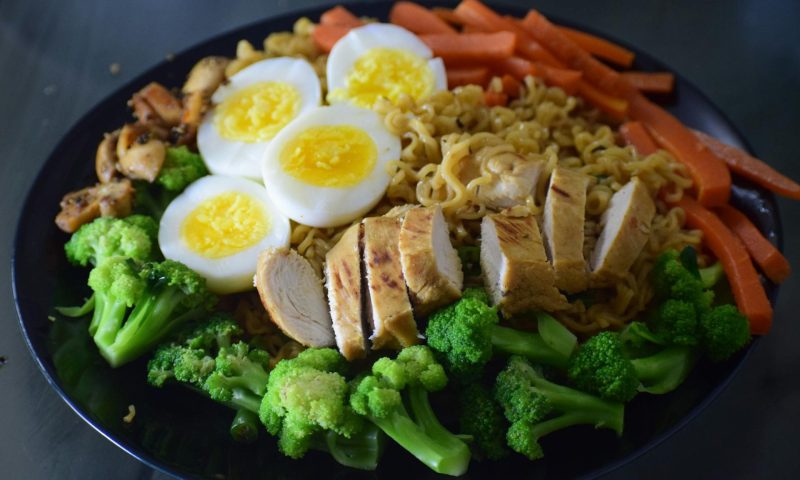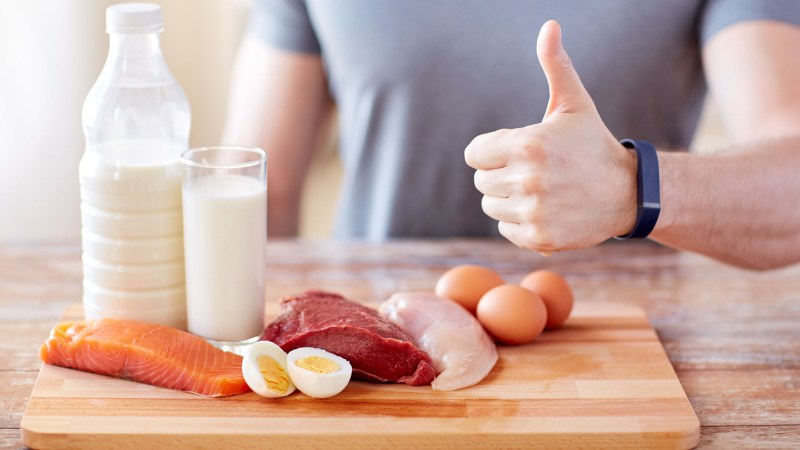When it comes to building muscle, nutrition is imperative. As a personal trainer and nutritionist, I share with my clients that they can be in the gym all they want, but they won’t see real progress unless they put equal effort into their diets. That’s where a muscle gain meal prep strategy can come into play.
If you are serious about your goals and want to dial in on your nutrition, keep reading to learn how to make your weekly meal prep both easy and effective!
Prioritize protein in every meal

When it comes to muscle gain meal prep, prioritizing protein in every meal is essential. Protein provides the building blocks your body needs to repair and grow muscle tissue after workouts. One NIH study supports this by sharing the following findings: “Protein supplementation during resistance training for ≥6 weeks augmented lean mass accretion by 27% (~0.3 kg) on average.”
Aim to include 25 to 40 grams of protein in each main meal, depending on your total daily needs. Great options for meal prep include grilled chicken, ground turkey, lean beef, eggs, Greek yogurt, tofu, tempeh, and legumes. Incorporate protein into snacks as well, with options such as cottage cheese, protein shakes, or hard-boiled eggs.
Spreading your protein intake throughout the day—rather than loading up all at once—helps maximize muscle protein synthesis and can be more manageable. When planning your meals, try identifying the protein source first, and then add in your carbs and healthy fats after. This strategy is especially helpful if you are trying to stay within a specific calorie limit.
Don’t forget to eat enough calories

To build muscle, eating enough calories is just as important as hitting your protein target. If you’re not in a calorie surplus—eating more than you burn—your body won’t have the energy it needs to grow new muscle and put toward said muscle.
When meal prepping for muscle gain, start by calculating your maintenance calories, then add 250 to 500 extra calories per day. Choose calorie-dense, nutrient-rich foods like whole grains, avocados, nuts, olive oil, and fatty fish to help you reach your goal without feeling overly full. Including snacks like trail mix, protein bars, or peanut butter with fruit can also boost your daily intake.
It is essential to track your calories consistently, especially during the first few weeks, as many people underestimate or overestimate their typical food intake. By planning meals that meet both your protein and calorie needs ahead of time, you’ll set yourself up for steady and sustainable muscle gain.
Batch cook your meals for the week

Batch cooking is one of the most effective ways to stay consistent with your muscle gain meal prep. Preparing meals in advance saves time, reduces stress, and ensures you always have high-protein, calorie-dense options ready to go.
Start by choosing two to three protein sources, like chicken, lean beef, ground turkey, or tofu, and cook them in bulk. Pair them with complex carbs such as brown rice, sweet potatoes, or quinoa, and add a variety of vegetables for nutrients and fiber.
Use airtight containers to portion out meals for the week. Label them by day or mealtime to stay organized and avoid decision fatigue.
You can also prep high-calorie snacks like overnight oats, protein muffins, or boiled eggs. Having your meals and snacks ready makes it easier to hit your daily goals, stay on track, and focus on training hard without worrying about what to eat.
Include carbs and fats for balanced growth

For muscle gain meal prep, including the right balance of carbohydrates and fats is crucial alongside protein. Carbs are your body’s primary energy source, fueling intense workouts and helping replenish glycogen stores in muscles after exercise. As we mentioned before, with your meal prep, you can incorporate complex carbohydrates like brown rice, quinoa, oats, and sweet potatoes into your meals to provide steady energy throughout the day.
Healthy fats are often neglected, but they are equally important for hormone production, including testosterone, which supports muscle growth. Include sources like avocados, nuts, seeds, olive oil, and fatty fish such as salmon. These fats also aid in nutrient absorption and overall health. They are also an easy way to hit your calorie goals, as one gram of fat equals nine calories.
Track your intake and adjust as you grow

Tracking your food intake is essential for successful muscle gain meal prep. By monitoring your calories, protein, carbs, and fats, you ensure you’re meeting your nutrition goals to support muscle growth. Use apps or food journals to log meals and spot trends or gaps in your diet.
As you build muscle and your body changes, your calorie and macronutrient needs may shift. Regularly reassess your progress and adjust your intake accordingly—this might mean increasing calories or protein to continue gaining muscle or tweaking carbs and fats for energy and recovery.
Consistent tracking and adjustment keep you on track, making your muscle-building journey more efficient and effective.
Frequently asked questions

How do you eat 3,000 calories a day to build muscle?
To eat 3,000 calories a day for muscle gain, focus on nutrient-dense, high-protein foods like lean meats, eggs, dairy, whole grains, nuts, and healthy fats. Divide meals into four to six servings daily, include calorie-rich snacks, and consider meal prepping to stay consistent and hit your calorie and protein goals.
What is the 60-25-15 meal plan?
The 60-25-15 meal plan is a macronutrient ratio commonly used for muscle gain or athletic performance. It means 60% of daily calories come from carbohydrates, 25% from protein, and 15% from fat. This balance supports energy, muscle recovery, and growth, especially when paired with consistent strength training.
Are three meals enough to build muscle?
Three meals a day can support muscle growth if they include enough calories and grams of protein. For example, they could each include 1,000 calories and 60 grams of protein to put you in a calorie surplus and provide plenty of protein to gain muscle. However, everyone’s nutritional needs are different.




